While doing some research about the Portuguese language you’ll find that there are two main types of it: Brazilian Portuguese and European Portuguese. From vocabulary, grammar, & pronunciation there are many differences between Brazilian Portuguese and European Portuguese. Even natives can misunderstand each other!
Brazilian Portuguese and European Portuguese might seem the same to a non-speaker, however, there are considerable differences between the two: the most obvious is the accent but there are also differences in the grammar and there are even some words that sound perfectly normal in European Portuguese but are an insult in Brazilian Portuguese. So, where did the Portuguese language came from? How did it evolve? and what are the main differences between the two types. That’s what we’ll be looking at as the Brazilian Portuguese vs Portugal Portuguese battle begins.
Where is Portuguese spoken? How many people speak Portuguese?
It might be hard for you to believe but, the truth is, Portuguese is the sixth most spoken native language in the world. The amount of native Portuguese speakers is estimated to be around 220 million people. Portuguese is spoken in ten different territories in four continents including:
- Portugal
- Brazil
- Mozambique
- Angola
- Guinea Bissau
- East Timor
- Equatorial Guinea
- Macau
- Cape Verde
- Sao Tome and Principe
If you search for sites to learn Portuguese online, you’ll find a lot of options but there’s one thing you’ll definitely notice: most of these sites and information are related to Brazilian Portuguese instead of European Portuguese. Even though Portuguese has its origins in Europe, there are way more Portuguese speakers in Brazil alone than anywhere else and that makes its accent the most spoken. To illustrate this, let’s look at the population of Rio de Janeiro compared to Portugal: the Brazilian city has 12 million citizens alone while the whole country of Portugal has only 10 million. So obviously, most of the 220 million native Portuguese speakers are actually Brazilian.
Going to Portugal? Get my free Portuguese travel phrase guide
 Can Portuguese and Brazilians understand each other?
Can Portuguese and Brazilians understand each other?
Even though the language is exactly the same, there are some differences between European and Brazilian Portuguese. When it comes to writing, both are very similar, but the pronunciation makes everything harder for Brazilians and the Portuguese to understand each other. Usually, it is more difficult for Brazilians to understand the Portuguese than the other way around. This might sound strange considering the language has its origins in Portugal but there are a few reasons why this happens. Portuguese people are used to listening to Brazilian Portuguese because there are a lot of Brazilian immigrants in Portugal. Another reason is the fact that the Brazilian culture is widely popular in Portugal. For many years, Brazilian soap operas were on the television in Portugal during primetime. Brazilian music is also extremely popular all over Portugal. Whilst Brazilian music and TV programs are popular in Portugal, the opposite is not true.
Why are there different types of Portuguese?
Just like the European Spanish is different from Latin American Spanish, so too is the Portuguese spoken in Europe compared to that in Brazil. Let’s go back a few centuries and try to understand why there are so many different types and accents of Portuguese. Portuguese is a romance language that, just like Italian, Spanish, and French, evolved from Latin after the Romans invaded the Iberian Peninsula 2,000 years ago. Portugal gained its independence in 1143, but it was only in 1290 when the first university was created in Lisbon by King Dinis that Portuguese was officially recognised as the official language of the country. From then on, the language was used for most official documents and, as time passed by, the similarities to Spanish faded as both languages evolved differently even though there are still lots of words that are written the same way.
During the Discoveries Era in the 15th and 16th century, Portuguese sailors brought their language to many parts of the world and that is the reason why the language is spoken in Europe, America, Africa and Asia. When taking the language to other territories, it ended up mixing with the language previously spoken in those areas.
The Portuguese discovered Brazil in 1500 and soon began to export their traditions, however, the language was only officially established in 1758. By that time, it had suffered from the influence of the indigenous people already living in the territories occupied by the Portuguese in the 16th century.
Colonies often follow the linguistic advances of the mother country but with a delay due to the geographical distance which leads some people to believe that the colonies often preserve the original language better than the mother country which has evolved faster.
The African countries that belong to the CPLP (“Comunidade de Países de Língua Portuguesa” or “Community of Countries with Portuguese Language” in English) use a Portuguese more similar to the European type than Brazil. That happened mainly because Brazil gained its independence from Portugal many years before the African countries. While Brazil was an independent country by 1822, Angola, for example, only became independent from Portugal in 1975 similar to most African countries. All those additional years of direct contact with the Portuguese makes the African accent more similar to the Portuguese accent.
Want to have fun whilst learning Brazilian Portuguese and European Portuguese? Struggling to find decent Portuguese language resources available? I recommend getting uTalk. Available as a desktop site and app, uTalk is awesome for learning key words and phrases in Portuguese (both European and Brazilian), especially if you want to use it for travel purposes. It’s great for beginners getting started in a language and invaluable for intermediates looking to fill in gaps in their vocabulary and pronunciation.
What I love most about uTalk is that you can jump around their extensive library of topics and choose what you want to learn, when you want, and at your own pace. Because I believe in uTalk so much, I reached out to them and we’ve teamed up to offer you an exclusive 30% OFF reader discount across all of uTalk’s 140 languages! This offer isn’t available anywhere else! Click here to claim your exclusive 30% discount in Brazillian Portuguese and European Portuguese here.

Brazilian Portuguese vs Portugal Portuguese: What are the main differences?
By now you might be thinking: “what are these differences between Brazilian and European Portuguese you keep on mentioning?”. Well, wait no more, here are some of the top 8 differences between European Portuguese vs Brazilian Portuguese:
1. ‘Tu’ vs. ‘você’
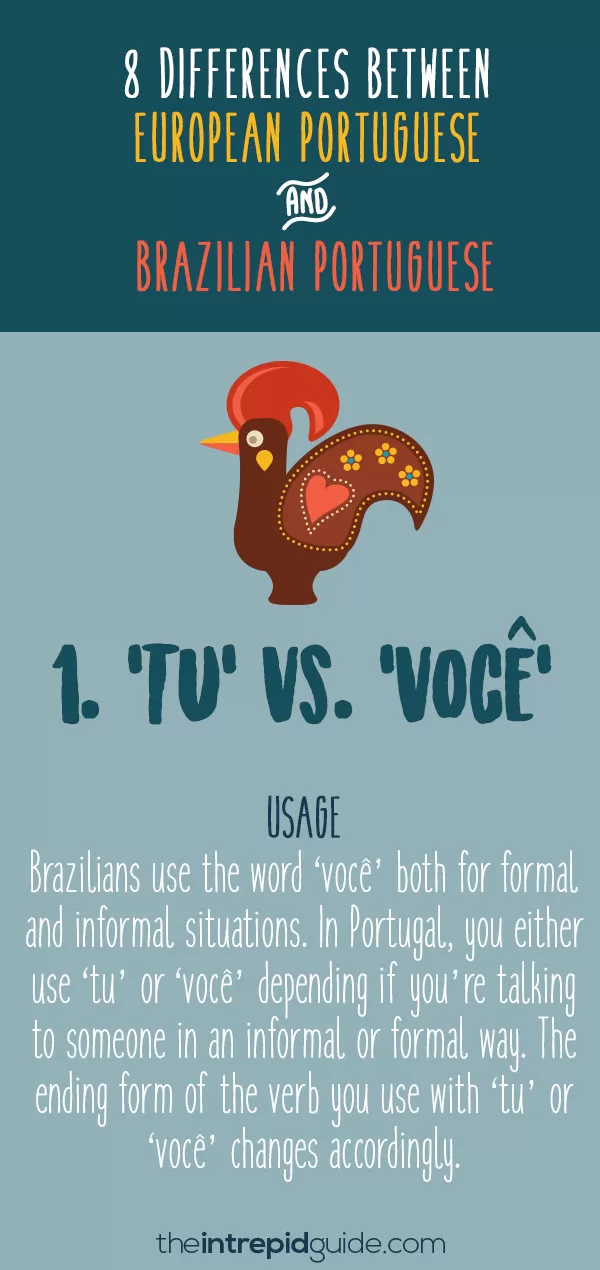 Brazilians use the word ‘você’ both for formal and informal situations (just like with ‘you’ in English). That doesn’t happen in European Portuguese. In Portugal, you either use ‘tu’ or ‘você’ depending if you’re talking to someone in an informal or formal way. The ending form of the verb you use with ‘tu’ or ‘você’ changes accordingly.
Brazilians use the word ‘você’ both for formal and informal situations (just like with ‘you’ in English). That doesn’t happen in European Portuguese. In Portugal, you either use ‘tu’ or ‘você’ depending if you’re talking to someone in an informal or formal way. The ending form of the verb you use with ‘tu’ or ‘você’ changes accordingly.
2. The Gerund: When is it used?
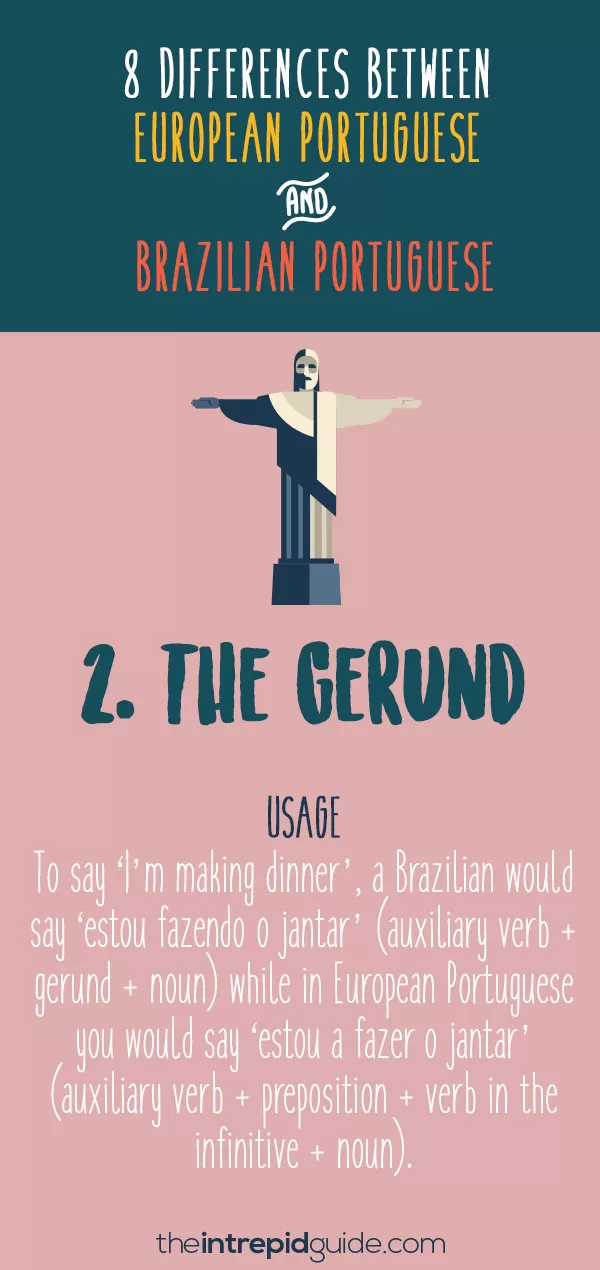 Whilst in Brazil people use the gerund on a regular basis, the same doesn’t happen in Portugal. Instead, European Portuguese uses a preposition followed by the infinitive of a verb. For example, to say “I’m making dinner”, a Brazilian would say “estou fazendo o jantar” (auxiliary verb + gerund + noun) while the European Portuguese would say “estou a fazer o jantar” (auxiliary verb + preposition + verb in the infinitive + noun).
Whilst in Brazil people use the gerund on a regular basis, the same doesn’t happen in Portugal. Instead, European Portuguese uses a preposition followed by the infinitive of a verb. For example, to say “I’m making dinner”, a Brazilian would say “estou fazendo o jantar” (auxiliary verb + gerund + noun) while the European Portuguese would say “estou a fazer o jantar” (auxiliary verb + preposition + verb in the infinitive + noun).
3. Pronunciation
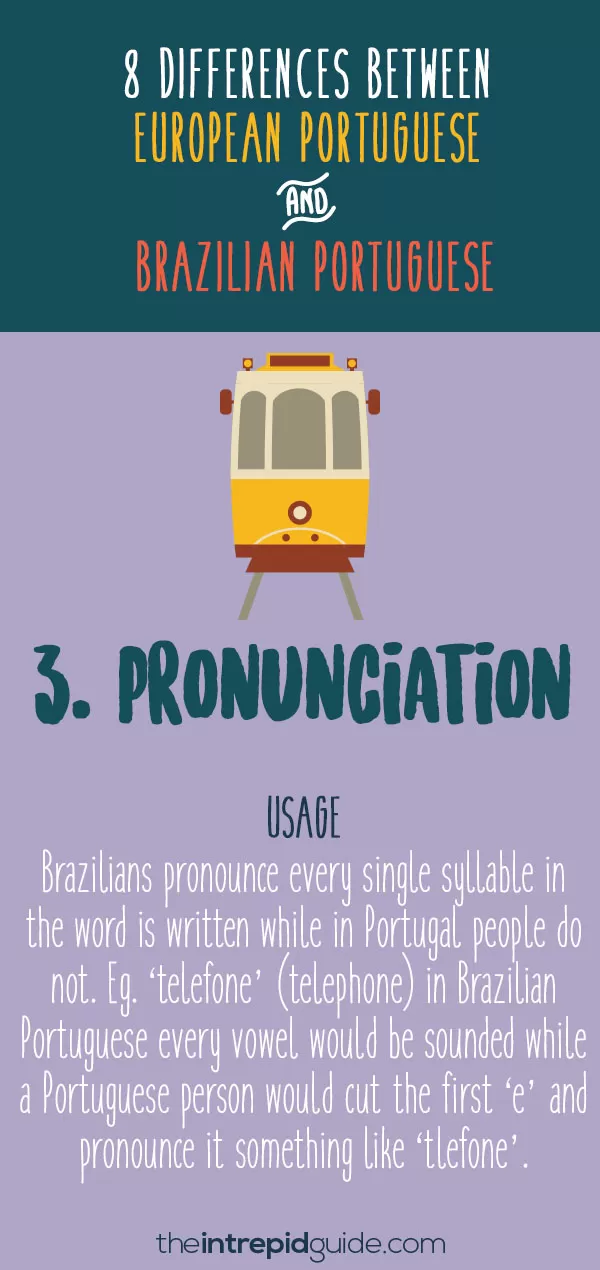 Brazilians have an open pronunciation whilst European Portuguese have a closed one. Trying to explain it a little better, Brazilians pronounce every single syllable in the word while in Portugal people do not. Let’s take the word “telefone” (telephone) as an example: Brazilian Portuguese would pronounce it accentuating every single vowel in the word while a Portuguese person would cut the first “e” and pronounce it something like “tlefone”. This is one of the many examples there are as European Portuguese tend to cut a lot of vowels in the words making them harder to understand for foreigners and even Brazilians.
Brazilians have an open pronunciation whilst European Portuguese have a closed one. Trying to explain it a little better, Brazilians pronounce every single syllable in the word while in Portugal people do not. Let’s take the word “telefone” (telephone) as an example: Brazilian Portuguese would pronounce it accentuating every single vowel in the word while a Portuguese person would cut the first “e” and pronounce it something like “tlefone”. This is one of the many examples there are as European Portuguese tend to cut a lot of vowels in the words making them harder to understand for foreigners and even Brazilians.
In addition to that, there’s also the pronunciation of some consonants such as the “s” at the end of a word. In Portugal, the “s” at the end of a word is read as “sh” while in Brazil it is read as “ss”. The word “dois” (two), for example, would be said “doish” in Portugal but “doiss” in Brazil. The “t” also has different pronunciations in both countries. While in Brazil you’d say the word “quente” (hot) as “quentchy” (adding a “ch” to the “t”), in Portugal you’d pronounce it solely “kent”.
Another significant difference in the pronunciation is the way the letter “L” is said in both countries. In European Portuguese it is said the same way as in English but in Brazil it gains a whole different pronunciation which is one of the most typical characteristics of the Brazilian accent. To say ‘Brazil’ in Brazilian Portuguese, you’d say something like “Brásiu”, replacing the “l” for an “u”. This happens with all L’s that are at the end of a word.
4. No need for personal pronouns before the verb
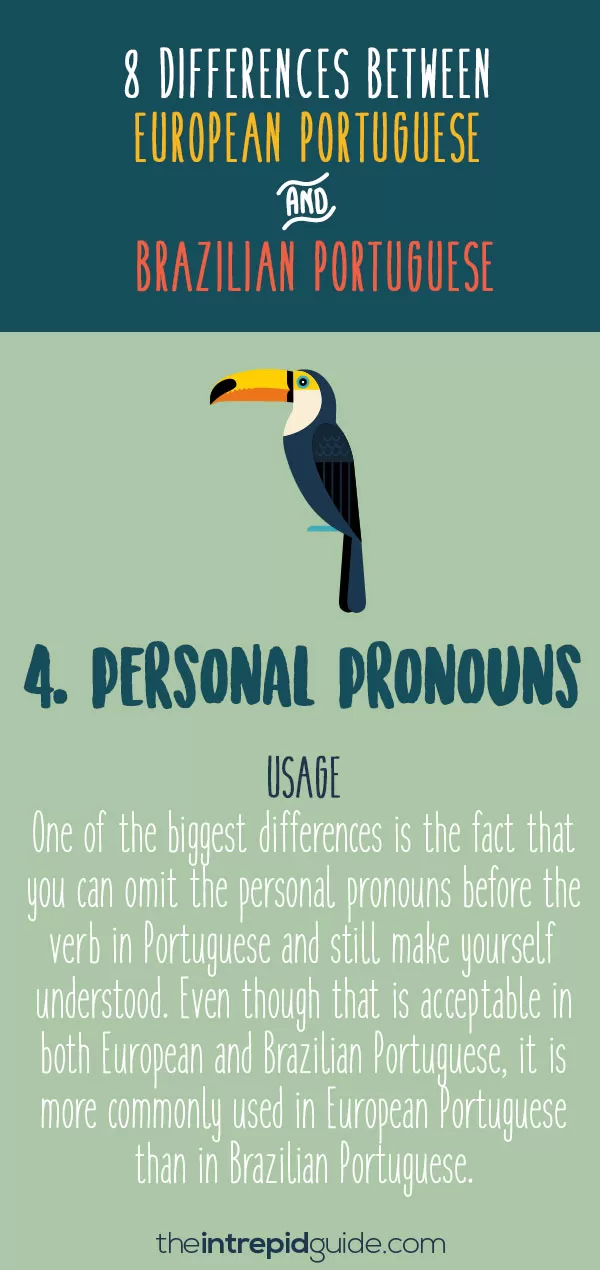 One of the biggest differences there are between Portuguese and English is the fact that you can omit the personal pronouns before the verb in Portuguese and still make yourself understood because the verbs are conjugated differently for all the pronouns. Even though that is acceptable in both European and Brazilian Portuguese, it is more commonly used in European Portuguese than in Brazilian Portuguese.
One of the biggest differences there are between Portuguese and English is the fact that you can omit the personal pronouns before the verb in Portuguese and still make yourself understood because the verbs are conjugated differently for all the pronouns. Even though that is acceptable in both European and Brazilian Portuguese, it is more commonly used in European Portuguese than in Brazilian Portuguese.
5. Spelling – The new writing agreement and its consequences
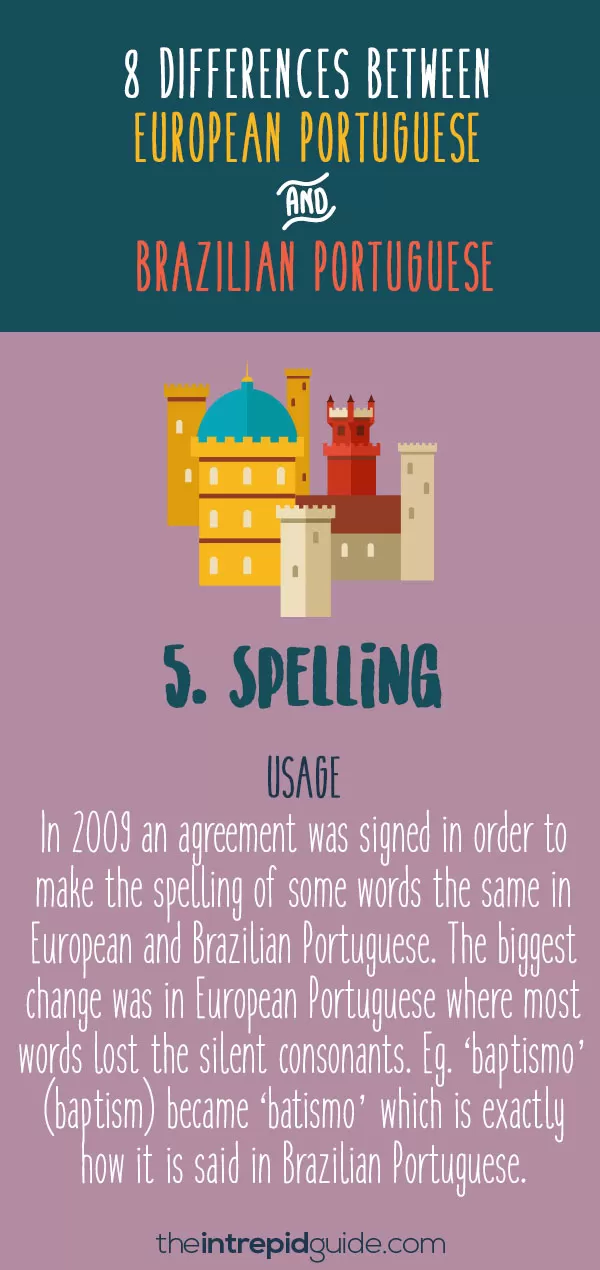 While pronunciation is different in both languages, the spelling is pretty much the same except for the when the words are different. In 2009 an agreement was signed in order to make the spelling of some words the same in European and Brazilian Portuguese. The biggest change was in European Portuguese where most words lost the silent consonants. For example, the word “baptismo” (baptism) lost its “p” in European Portuguese since no one would read the “p”. The new word is “batismo” which is exactly how it was said in Brazilian Portuguese even before the agreement was implemented.
While pronunciation is different in both languages, the spelling is pretty much the same except for the when the words are different. In 2009 an agreement was signed in order to make the spelling of some words the same in European and Brazilian Portuguese. The biggest change was in European Portuguese where most words lost the silent consonants. For example, the word “baptismo” (baptism) lost its “p” in European Portuguese since no one would read the “p”. The new word is “batismo” which is exactly how it was said in Brazilian Portuguese even before the agreement was implemented.
This agreement caused a lot of adverse reactions mainly from the European Portuguese side as it made the most changes to the spelling of the words. Even if there are words that lost their silent consonants in European Portuguese, there are the cases where those consonants still exist in Brazilian Portuguese. “Receção” (reception) is one of those cases. It used to be written “recepção” both in European and Brazilian Portuguese but with the new agreement it lost the “p” in European Portuguese but not in Brazilian Portuguese.
6. Pronouns – Do the pronouns come before or after the verbs?
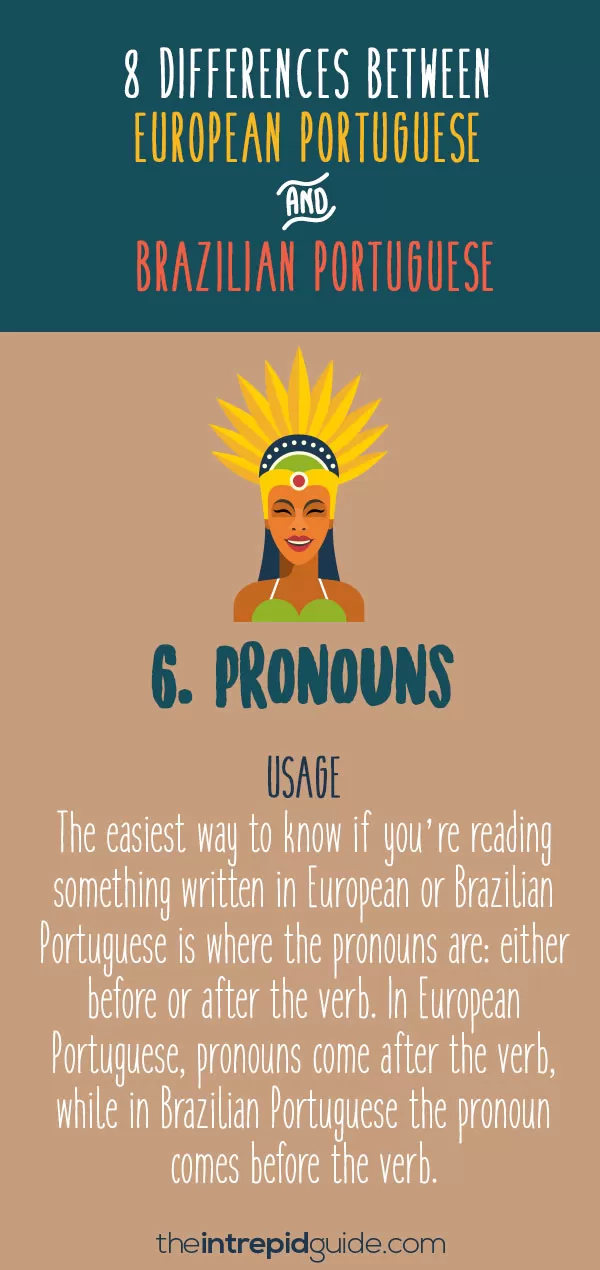 The easiest way to know if you’re reading something written in European or Brazilian Portuguese is where the pronouns are: either before or after the verb. In European Portuguese, pronouns come after the verb, while in Brazilian Portuguese the pronoun comes before the verb.
The easiest way to know if you’re reading something written in European or Brazilian Portuguese is where the pronouns are: either before or after the verb. In European Portuguese, pronouns come after the verb, while in Brazilian Portuguese the pronoun comes before the verb.
For example, let’s take the way “I love you” is said in Portuguese. First of all, as explained before, you can omit the personal pronoun “I” (which is “Eu”) yet it is much more common to do so in European Portuguese than in Brazilian Portuguese as it sounds better in both types that way. That said, in European Portuguese we would simply say “amo-te” while in Brazilian Portuguese we would have to say “Eu te amo”. The “te”, which refers to “you” changes its position in the sentence according to the type of Portuguese you are writing or reading.
Pronouncing this word or sentence is incredibly different too. As we saw earlier, Brazilian Portuguese is pronounced with an open accent while European Portuguese uses a closed accent. While in South America, natives would say this sentence as “eu tchi amo”, in Europe natives would say something like “am’t” cutting most of the sound of the vowels.
7. Vocabulary
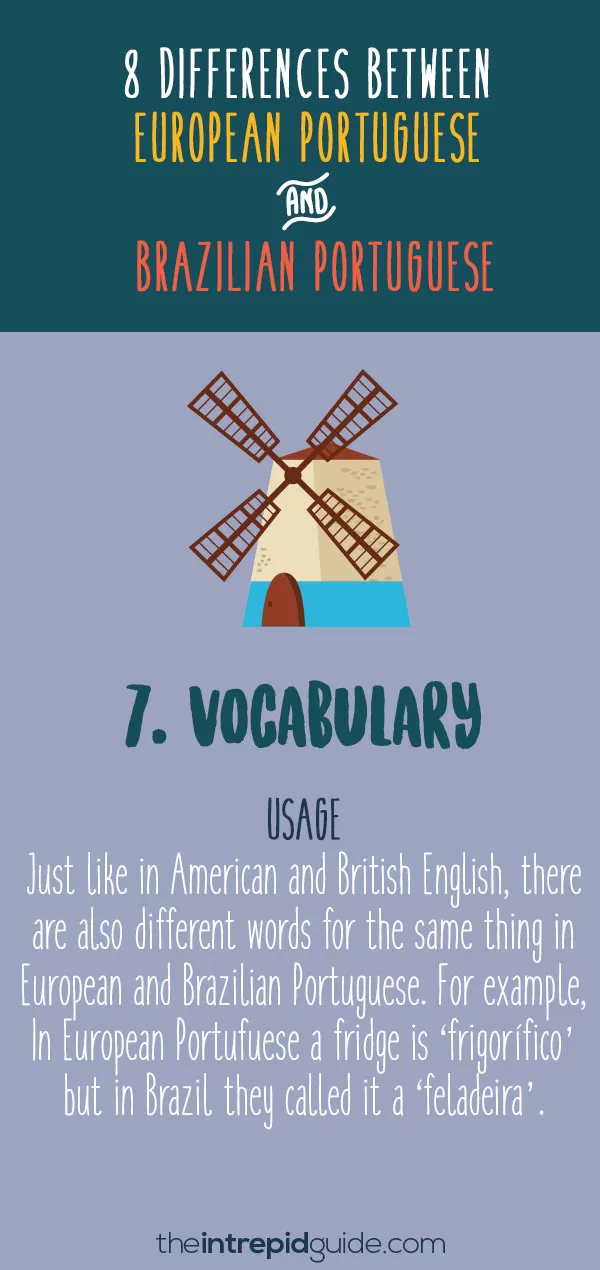 Just like in American and British English, there are also different words for the same thing in European and Brazilian Portuguese. We could be here all day talking about those but here are some examples:
Just like in American and British English, there are also different words for the same thing in European and Brazilian Portuguese. We could be here all day talking about those but here are some examples:
| English | European Portuguese | Brazilian Portuguese |
| Brown | Castanho | Marrom |
| Ice cream | Gelado | Sorvete |
| Cup | Chávena | Xícara |
| To hurt | Aleijar | Machucar |
| Fridge | Frigorífico | Geladeira |
| Suit | Fato | Terno |
| Bus | Autocarro | Ônibus |
| Train | Comboio | Trem |
| Bathroom | Casa de banho | Banheiro |
| Cell phone / phone | Telemóvel | Celular / Telefone |
| Juice | Sumo | Suco |
Some words, such as “ônibus” and “trem” have clear influences on English words with the same meaning. Some others like “fato” have a different meaning in European and Brazilian language. “Fato” means ‘fact’ in Brazil while in Portugal it is said “facto”.
8. False friends
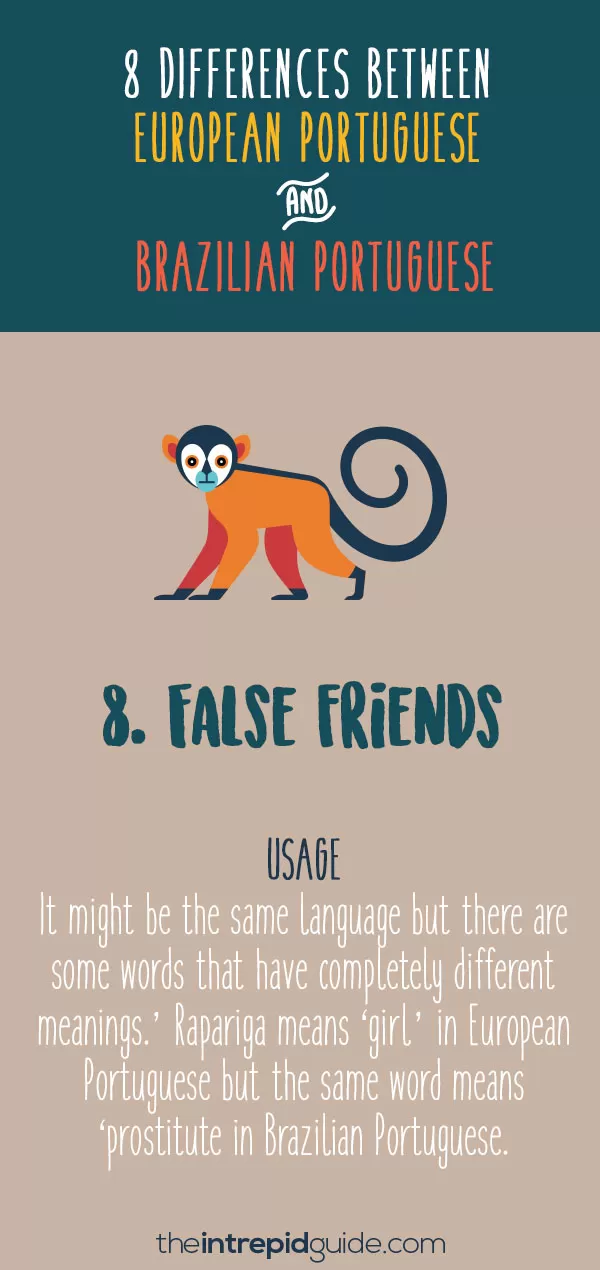 It might be the same language but there are some words that have completely different meanings in European and Brazilian Portuguese: “Rapariga” means “girl” in European Portuguese and is the most common word used for it. But do not call a girl “rapariga” in Brazil. It isn’t something they won’t understand, on the contrary, they will understand but won’t take it as an ordinary word but as an insult – a big one as a matter of fact – as “rapariga” is another word for “prostitute” in Brazilian Portuguese.
It might be the same language but there are some words that have completely different meanings in European and Brazilian Portuguese: “Rapariga” means “girl” in European Portuguese and is the most common word used for it. But do not call a girl “rapariga” in Brazil. It isn’t something they won’t understand, on the contrary, they will understand but won’t take it as an ordinary word but as an insult – a big one as a matter of fact – as “rapariga” is another word for “prostitute” in Brazilian Portuguese.
“Propina” might sound like a perfectly ordinary word in Portugal. It is the fee students pay in the university. In Brazil, referring to a payment as a “propina” actually means “bribe”.
“Apelido” refers to a name on both sides of the Atlantic yet asking for someone’s “apelido” in both countries will get you different answers. In Brazil, people will tell you their nickname while in Portugal people will tell you their surname.
“Cara” means “face” in both types of Portuguese. In Brazil it is also commonly used to call someone. Kind of the equivalent to “dude” in English.
Which type of Portuguese is easier to learn?
Portuguese isn’t the easiest language to learn, especially if you don’t speak Spanish or Italian (which are fairly similar to Portuguese when it comes to grammar). People learning Portuguese tend to say that the Brazilian Portuguese is easier to learn and understand. That happens because of the pronunciation. As Brazilians say all the letters in a word with an open accent, it makes it easier to understand for a foreigner than when the Portuguese cut the sound of most vowels.
One thing for sure is you’ll learn the language easier if you decide to study it in the country of its origin. When it comes to deciding whether you should study Portuguese in Portugal or in Brazil, there are some things to take into consideration. Portugal is much smaller than Brazil and it is more of a European country with a Mediterranean climate, while Brazil is a large country where summer lasts all year around. But, besides the language itself, there is one thing that unites these two countries: the people. Whether you go to Brazil or to Portugal, you will be made to feel welcome in both countries and you’ll find people available to help you.
What are the main difference between Portuguese and English?/h2>
There are a lot of words that are similar in Portuguese and English but there are also a lot of differences mostly in the grammar. The most obvious difference is the verbs conjugations. While in English the regular verbs have the same conjugation for I, he/she or you, we and they, in Portuguese there are different conjugations for every person.
Another significant difference between the two languages is the verb “to be”. In Portuguese it has two different meanings: “ser” and “estar”. The difference is quite simple but doesn’t exist in English: using the verb “to be” to say “I am American” or using it to say “I am in America” is completely different. For the first example, the verb “ser” is used in Portuguese while for the second example it is the verb “estar” that is used. “Eu sou bebedo” (I am a drunk) and “eu estou bebedo” (I am drunk) are two very different things yet in English they sound the same as the verb doesn’t change.
In English, the adjective comes before the noun it is referring to while in Portuguese it happens the other way around. For example, while in English we’d say “a red hat”, in Portuguese we’d say “um chapéu vermelho” (“vermelho” meaning red and “chapéu” meaning hat).
Which type of Portgueuse Should You Learn?
When it comes to deciding whether you should learn European or Brazilian Portuguese, it depends a lot on your personal goals. You’ll be able to read in both types no matter which one you’ll choose to learn even if there are a few differences. When it comes to speaking and listening, it won’t always be easy for you to understand what people with a different accent are saying but, as we’ve learned, not even the natives can understand each other all the time.
A big thanks to Lusa Language School who helped write this guide. Feeling inspired to learn Portuguese?
Learn European Portuguese in Portugal
Lusa Language School is a Portuguese school for foreigners located in Cais do Sodré, in the heart of Lisbon. Besides the courses, it has social activities such as dinners every Friday night and organises tours to some of the most famous monuments in Lisbon including the castle or Mosteiro dos Jerónimos.
Types of courses:
- Intensive course: 4 hours a day, 5 days a week for each module
- Part-time course: 2 hours a day, 2 days a week, 5 weeks for each module
- Full Immersion course: mixes the intensive course with 5 extra private lessons each week
- Private classes
- Online classes
Sources
Lusa Language School / Oxford Dictionaries / Babbel / Mezzoguild
Like it? Pin it for later!
Want more? Here are some hilarious Portuguese expressions!
Want to know more about learning languages? Start here!
- 25 Hilarious Portuguese Phrases That Make No Sense
- Survival Portuguese Travel Phrase Guide with Pronunciation
- Top Language Learning Resources You Should Use
- 11 Life-Changing Reasons Why You Should Learn a Language
- 42 beautiful Inspirational Quotes for Language Learners
- Language learning tips: 11 Polyglots Reveal The Secrets of Their Success
- Top 10 Best Ways to Learn a Language Better and Faster
- How Many Languages are there in the World?
Over to you!
Are you learning Portuguese? Which of these differences surprises you the most?
Let me know using the comments section below or join me on social media to start a conversation.
Thanks for reading and I hope you enjoyed this post.
Like what you see? Subscribe using the form below to have all of my posts delivered directly to your email.


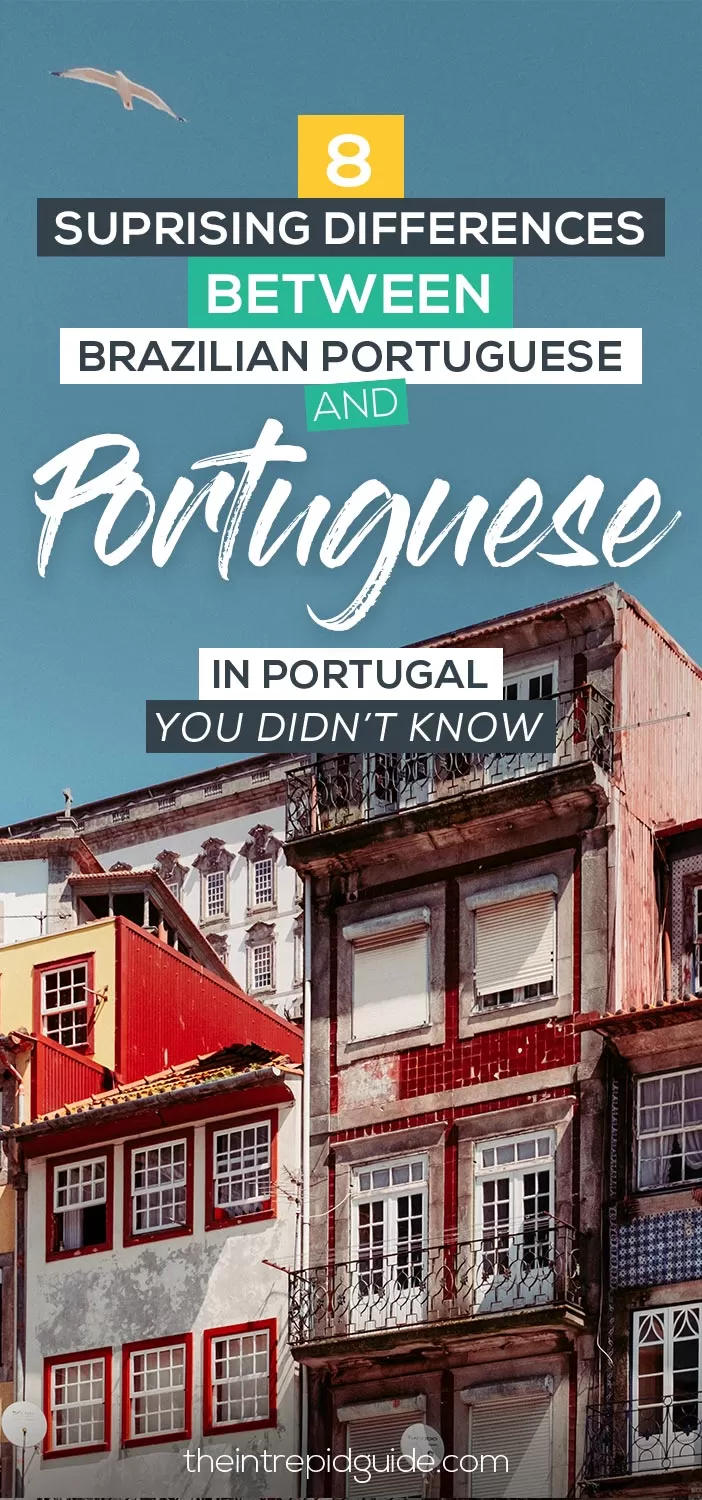
9 comments
Hey.
First of all, I’d like to congratulate you for the post. Secondly, there’s a word miswritten: phone. In Brazilian Portuguese, it’s celular (the r was forgotten) or even telefone.
Thank you Felipe for this correction :)
Thanks for this. Such a comprehensive but concise article, very well written. And it reassured me that, though I wanted to learn Portuguese from Portugal, learning Brazilian Portuguese (with DuoLingo) is still a good choice. I’ll just have to watch out that I don’t accidentally bribe a prostitute when I just want to pay a girl…
Haha my pleasure! Thank you Hanneke :) Best of luck with your language learning journey :)
Nice writeup. I’m a nigerian learning brazilian portuguese and i find it easy to understand.
That’s wonderful, Stephen :) I hope you’re enjoying it!
Takk Michele. Interessant å lese guiden din om portugisisk. Eg prøver å lære meg litt portugisisk, og brukar Drops. (Europeisk) Men har og brukt Duolingo, og den er berre Brasiliansk. Igjen, takk for god informasjon, og ha ein fin dag.
Vennlig helsing Ivar.
Tusen takk for denne guiden. Eg visste det var europeisk og brasiliansk portugisisk, men fint å få vite litt meir om forskjellen. Tusen takk. Helsing Ivar
Tusen takk til deg også Ivar. Jeg er så glad du likte denne guiden ?